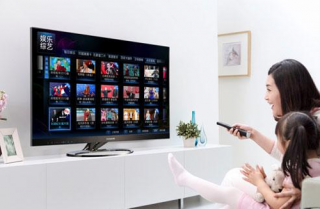Smart TV refers to a full-open platform like a smart phone. It is equipped with an operating system. Users can install and uninstall programs such as software and games provided by third-party service providers. Through such programs, the functions of color TVs are continuously implemented. A general term for such a type of color TV that expands and can be used to surf the Internet through a network cable or a wireless network. Cloud TV is a TV product that uses cloud computing and cloud storage technology, and is a kind of cloud device. In layman's terms, users do not need to separately equip their TVs with all Internet functions or content. When you connect your TV to the Internet, you can retrieve the resources or information you need from outside. For example, you can install them on the cloud TV. Use a variety of instant messaging software to socialize, work, etc. while watching TV. Cloud TV is based on the way that smart TV backgrounds have cloud applications. Cloud TV itself is a smart TV. All cloud TVs are smart TVs, but not all smart TVs are cloud TVs. Smart TV and cloud TV have the following nine differences:
1. Cloud application: Cloud TV application becomes cloud application through cloud platform to realize sharing among cloud users. Smart TV only has intelligent application and cloudless application.
2, family attributes: For example, smart TV can only log in to a single QQ, and cloud TV can log in to the QQ group, we believe that in the era of cloud technology, if you can not share accounts, do not have family attributes.
3, resource enjoyment: the real cloud TV is an account that does not need to be registered, various cloud resources can be shared at any time, truly bring entertainment to users, and smart TV can not be achieved.
4, cross-machine use: cloud TV login cloud account, user habits, attributes, records, preparation and their own TV, smart TV can not be used across machines. My concept of cloud mobile phone, cloud mobile phone is not a mobile phone, cloud mobile phone is just a concept.
5. Coordinating application: Cloud TV can co-ordinate all cloud applications and open new cloud applications. Smart TVs need to register accounts and log in separately before entering each application. Cloud TV is more convenient, faster, and more resource-rich.
6, hardware dependence: cloud TV through the cloud collaborative computing, expand the performance of the TV itself, low dependence on hardware updates, smart TV completely depends on local hardware, affected by the speed of hardware update, fast elimination.
7, personalized desktop system: cloud TV theme / module DIY, one set to N, smart TV can not be changed.
8. Personalized content push: Cloud TV automatically connects with the cloud through the cloud account, receives various information of cloud push and reservation, and realizes interaction with multi-device cloud users. Smart TV can only rely on intelligent applications to realize some interactive functions.
9. Background content aggregation: The content comes from Internet aggregation, which is more suitable for users in the form of TV. The cloud TV cloud is for the TV itself, the smart TV content is from the specified application, and the smart TV cloud is based on the cloud of an application. .

Smart TVs and cloud TVs have their own different characteristics and differences. They can be purchased according to their specific needs. Do not blindly pursue price factors.
1. Cloud application: Cloud TV application becomes cloud application through cloud platform to realize sharing among cloud users. Smart TV only has intelligent application and cloudless application.
2, family attributes: For example, smart TV can only log in to a single QQ, and cloud TV can log in to the QQ group, we believe that in the era of cloud technology, if you can not share accounts, do not have family attributes.
3, resource enjoyment: the real cloud TV is an account that does not need to be registered, various cloud resources can be shared at any time, truly bring entertainment to users, and smart TV can not be achieved.
4, cross-machine use: cloud TV login cloud account, user habits, attributes, records, preparation and their own TV, smart TV can not be used across machines. My concept of cloud mobile phone, cloud mobile phone is not a mobile phone, cloud mobile phone is just a concept.
5. Coordinating application: Cloud TV can co-ordinate all cloud applications and open new cloud applications. Smart TVs need to register accounts and log in separately before entering each application. Cloud TV is more convenient, faster, and more resource-rich.
6, hardware dependence: cloud TV through the cloud collaborative computing, expand the performance of the TV itself, low dependence on hardware updates, smart TV completely depends on local hardware, affected by the speed of hardware update, fast elimination.
7, personalized desktop system: cloud TV theme / module DIY, one set to N, smart TV can not be changed.
8. Personalized content push: Cloud TV automatically connects with the cloud through the cloud account, receives various information of cloud push and reservation, and realizes interaction with multi-device cloud users. Smart TV can only rely on intelligent applications to realize some interactive functions.
9. Background content aggregation: The content comes from Internet aggregation, which is more suitable for users in the form of TV. The cloud TV cloud is for the TV itself, the smart TV content is from the specified application, and the smart TV cloud is based on the cloud of an application. .

Smart TVs and cloud TVs have their own different characteristics and differences. They can be purchased according to their specific needs. Do not blindly pursue price factors.
Wall Recessed Electric Fireplace
Wall Recessed Electric Fireplace,Electric Heater,Recessed Electric Fireplace,Square Electric Fireplace
JINAN LODOR CNC EQUIPMENT CO.,LTD , https://www.zgfireplace.com